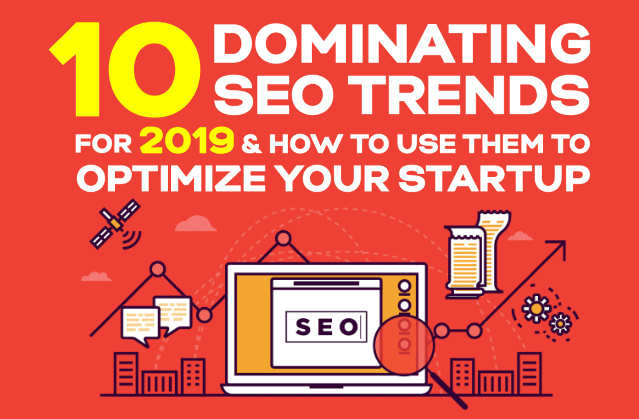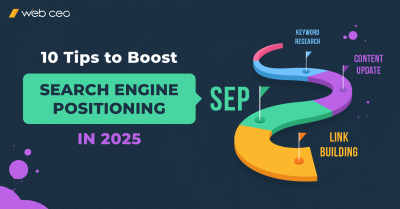
As Google changes all year round, so does search engine optimization. Webmasters who want to keep their rankings and traffic (and potentially gain even more) are always on the lookout for the new ways to beat their competitors, thus setting new SEO trends. And now that 2018 is rapidly approaching its end, it’s time to ask ourselves: what can we expect from SEO in 2019?
Folks from Logo Design Guru took it upon themselves to look into this problem. The result is an infographic describing the latest SEO trends which will be prevalent in the coming year. What are they?
1. Voice search domination
The list opens with the entry everybody saw coming. It’s hard not to, with so much talk about it! The bigger mobile Internet grows, the further we get removed from good old orthodox typing. Teaching computers to understand our speech – that’s what the future is about. And the path to this bright future lies through voice search SEO.
It is said that by 2020, half of all online traffic will be coming from spoken queries. I can only imagine what kind of futuristic technology will eventually come to replace voice search. Can you?
2. Video optimization
Voice search isn’t the only SEO trend taking over the Internet; videos are, too. They are an ever increasingly popular information medium, which makes them a rich source of customer traffic when you use them cleverly.
While your videos need to be excellent in order to rank on YouTube (any other quality standard is unacceptable there), they won’t be able to without being optimized for carefully picked keywords.
A different 2020 prediction says that videos will become a magnet for 75% of all Internet traffic. Get with the times or get crushed by the competition!
3. Mobile-first indexing
2018 was the year when Google finally rolled out their mobile-first index. How does it work? Simply put, websites are now ranked based on the quality of UX they provide on mobile devices. If a site has mobile and desktop versions, the index adds the mobile one; if there’s only the desktop version, it gets indexed the same as normal.
What does this tell us? You need to master mobile SEO! You must have a mobile-friendly version of your site, or else Google will index something you can’t show to mobile users. And a large chunk of traffic will go right past you.
4. Quality content development
Content is king, and high-quality content opens the path to high Google rankings; this is common knowledge. But what exactly does it mean? What kind of content counts as “high-quality”?
It’s actually pretty easy once you remember who the content is meant for: users. When they do a Google search, they hope to find something that will satisfy their needs 100% and then some more. When you take the users’ search intent into account, you can prepare a piece of content that does exactly that. The Internet will be dominated by people who are the best at getting into their audience’s mindset.
To provide the best copywriting, you should know where your competitors stand and what they have to offer. This is where WebCEO’s SEO Content Checker Tool comes into place.
5. Protection of user data
Online security is a huge deal – and fortunately, the powers that be are taking it seriously. Earlier this year, the EU enacted the General Data Protection Regulation which entitles users to more control over their private information that’s used by sites. While it certainly works towards making user data safer, there are still many vulnerabilities that can be exploited by malicious third parties. It’s too early to celebrate just yet!
2019 will undoubtedly present us with more data protection initiatives, as well as more ways to make our online experience more secure.
6. Seamless user experience
The user experience on a website can make or break a deal of any magnitude. Therefore, business owners who would prefer to keep making a profit with their sites will do their best to guarantee a silky smooth UX. That means an easy-to-understand, intuitive design, a low page load time, and absolutely no technical issues.
A website gives a better impression of a business than any advertisement. Never let your most powerful assets tarnish your reputation. For ensuring your site is up to the mark, use WebCEO’s Website Audit Tool to identify and fix any on-page issues and get to the high.
7. Blockchain for SEO
Blockchain technology has uses in making the Internet more secure, which is why it’s been getting more popular lately. Webmasters are looking for ways to integrate it into their sites and potentially profit from it. It is expected that blockchain can also be used in SEO for things like validating backlinks.
The exact effect blockchain is going to have on SEO is not clear yet, but enthusiastic webmasters are already carrying out their experiments. We may see the fruits of their labor in 2019.
8. Influencer marketing
It’s always great to have someone important vouch for you. Especially in business, where there’s so much competition and you want people to know at least that you are here for them. What tricks do companies use to get an advantage? There are too many to list, but one of the most trending ones is to involve an influencer in your marketing campaign.
To do that, you need to connect with an influencer first. Fortunately, pretty much all of them use social media, so it’s only a matter of finding a way to get their approval of what you do. Did you know that 99% of all influencers spend their time on Instagram? There’s your easiest chance to connect with a few.
9. Long and in-depth content
Everyone can agree that the more time users spend on your website, the better. Long content obviously takes more time to consume, which makes it seem like the ideal solution. In reality, size doesn’t matter. Or rather, you can’t expect users to be satisfied with size alone.
And yet the websites ranking on the first page of Google tend to have over 2000 words. If their secret is not the length of their content, that logically leaves its depth and quality. Content that is not just long, but also engaging keeps its status as the page one ranking winner even in 2019.
10. Artificial intelligence
AI technology has massive potential. It’s little wonder businesses are actively looking for ways to use it in their work. The same goes for Google, and if (or rather when) they figure out how to make it work, it will inevitably affect SEO.
As an example of how artificial intelligence could be integrated into Google’s ranking algorithm, it can be used to more effectively sniff out websites practicing black-hat SEO.



